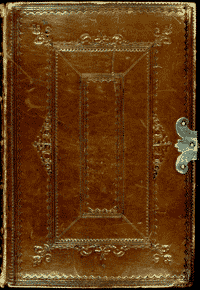| | Home | Resources | Schools Programme | Teachers | Site help | About us | Contact us | |
| You are here: Home > Resources > Scottish Wars of Independence > Ayr Manuscript, 1318 |

The Ayr Manuscript, 1318A written record of the Acts of Parliament from 1318 has survived in a book known today as the Ayr Manuscript. The laws, written in Latin, vary from matters relating to justice and the treatment of suspected traitors to the protection of fish stocks and cattle. The introduction states that the acts were agreed by the full parliament and the statutes were to be read and cried at our courts... and in other places where most happens congregation of the people. (National Records of Scotland reference: PA5/2 folio 43; also Acts of the Parliaments of Scotland i, 466) Four extracts from the Ayr Manuscript are included below. | ||||
Chapter 2 - Justice for all(National Records of Scotland reference PA5/2/44; Acts of the Parliament of Scotland I, 467, i) TranslationThe lord king wishes and orders that common law and common justice be done as well to poor people as to rich people according to the old laws and liberties justly used before these times. | ||||
Chapter 11 - The protection of fish stocks(National Records of Scotland reference PA5/2/46; Acts of the Parliament of Scotland I, 469, xi) Translation
It is ordained and agreed that all who have cruives [fish traps across rivers or estuaries], fishings, stanks [ponds] or mills in waters where the sea ebbs and flows and where little salmon, smolts [young salmon], fry or other types of fish of salt water or fresh water descend and ascend, such cruives and machines shall measure at least 2 inches in length and 3 inches in breadth, so that they can freely ascend or descend anywhere. | ||||
Chapter 16 - Compensation for the theft of cattle(National Records of Scotland reference PA5/2/47; Acts of the Parliament of Scotland I, 471, xvi) TranslationIn pleas concerning the theft of cattle, complainants must provide the court with full details of when the animals were stolen - the year and the day; how many were taken; where they were taken from; where they were found and if any injury or damage, great or small, was caused. | ||||
Chapter 21 - The treatment of conspirators(National Records of Scotland reference PA5/2/49; Acts of the Parliament of Scotland I, 472, xxi) TranslationThe lord king orders that no one shall be a conspirator or inventor of stories or rumours by which discord might arise between the lord king and his people. If anyone is charged with this crime, he will be taken immediately to prison and there be safely guarded until the lord king shall instruct his will about him. | ||||
How the Ayr Manuscript survivedThe Ayr Manuscript appears to have belonged to the Burgh of Ayr in the 1400s but no record of its ownership exists for the next few hundred years. In 1824, it appeared on a bookstall in Ayr where it was bought by Ebenezer Thomson, one of the masters at Ayr Academy. It was then passed into the care of the General Register House [now the National Records of Scotland] where it remains today. | ||||
|
|